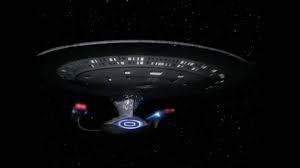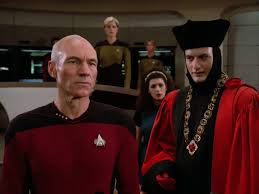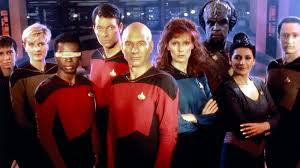The Enterprise crew battle to save a cosmic paradise in the ninth ‘Star Trek’ feature film…
–
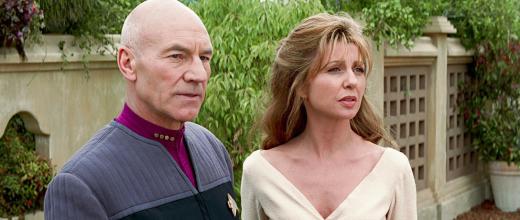
Patrick Stewart and Donna Murphy in ‘Star Trek: Insurrection’ (imaged credit: Paramount Pictures).
Year: 1998
Starring: Patrick Stewart, Jonathan Frakes, Brent Spiner, LeVar Burton, Michael Dorn, Gates McFadden, Marina Sirtis, F. Murray Abraham, Donna Murphy, Anthony Zerbe
Directed by: Jonathan Frakes / written by: Michael Piller (story by Rick Berman & Michael Piller. Based upon Star Trek, created by Gene Roddenberry)
What’s it about?
Captain Picard and the loyal crew of the U.S.S. Enterprise disobey Starfleet orders to protect the B’aku, whose homeworld produces rejuvenating effects which a race called the S’ona plan to exploit…
Retrospective/review
The success of Star Trek: First Contact was surely a tough act to follow and although 1998’s Star Trek: Insurrection would not prove to be as good, the result would be an enjoyable, if inferior, big screen instalment of Star Trek. With Jonathan Frakes back in the director’s chair, the screenplay for Insurrection would be tackled by former Star Trek: The Next Generation head writer (and co-creator of television spin-offs Deep Space Nine and Voyager) Michael Piller, who had helped to guide that series to greater creative success and penned various standout episodes including the beloved two-parter “The Best of Both Worlds”. From a story by himself and producer Rick Berman, Piller’s script provides a very Star Trek-like narrative that deals with moral themes and ethical quandaries traditional of the franchise and the types of character-driven stories that Piller favoured. As the title implies, Star Trek: Insurrection see Captain Picard and his crew defy orders to protect the population of the planet Ba’ku, the rings of which produces a rejuvenating radiation (making the world a sort of galactic fountain of youth) which Starfleet and the Federation, in partnership with a race called the Son’a – who are trying to preserve their lives via genetic manipulation and cosmetic surgeries – seek to harvest and share for the benefit of the many.
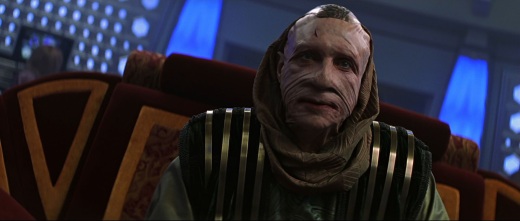
F. Murray Abraham as Ru’afo – the main villain of ‘Star Trek: Insurrection’ (Image credit: Paramount Pictures).
Picard learns from his superior, Admiral Dougherty (Licence to Kill’s Anthony Zerbe), that the 600-something population of Ba’ku are not indigenous to the planet – a fact that the Federation cites as justification for its actions, which the Son’a (lead by F. Murray Abraham’s Ru’afo) have manipulated to their advantage – and that the process of collecting the ring’s particles will render the world uninhabitable. Yet the Ba’ku people are a peaceful group and Picard feels that to forcefully relocate them is a betrayal of everything he believes in and the core values upon which the Federation was founded, for which he is prepared to risk his career…and possibly his life.
Insurrection may seem, for better or worse, more like an extended episode of The Next Generation (albeit on a larger scale and with a much higher budget) and fails to match the overall excellence of First Contact but it’s still an entertaining watch with a good dose of drama, action and humour. Jonathan Frakes once again directs with skill and a knowledge and appreciation for the history of Star Trek: The Next Generation and its characters. As Commander Riker, Frakes is afforded a larger and slightly more significant role than in First Contact (notwithstanding him shaving off his beard) – the youthful effect of the Ba’ku radiation leading to a rekindling of romance between Riker and Counsellor Troi (Marina Sirtis) and the plot leading to Riker’s command of the Enterprise in its battle with the Son’a as Picard and his team fight to protect the Ba’ku on the ground.
It goes without saying that Patrick Stewart (who is also credited as ‘Associate Producer’) is great in the film, with another strong portrayal as Picard and Insurrection provides him with a romantic interest in the form of Donna Murphy’s Ba’ku villager, Anij. Brent Spiner, again, proves solid support as Data and his befriending of one of the young Ba’ku (Artim, played by Michael Welch, who would go on to appear in Tim Burton’s Planet of the Apes) is a highlight. The rest of the TNG cast also get their moments, Michael Dorn’s Worf once more joining his former crewmates for their latest adventure – the B’aku radiation hilariously causing “aggressive tendencies” as it triggers the hormonal effects of Klingon adolescence – and blind Chief Engineer Geordi LaForge (Levar Burton) finds his eyesight temporarily restored. As Doctor Beverly Crusher, Gates McMadden has less to do but does share some fun and humorous scenes with Patrick Stewart, Marina Sirtis and Brent Spiner. Leading the threat against the Enterprise crew is Academy Award winner F. Murray Abraham (Amadeus) who is superb as the Son’a leader, Ru’afo, with a hefty and maniacal performance providing a worthy antagonist for Patrick Stewart’s Picard to face.
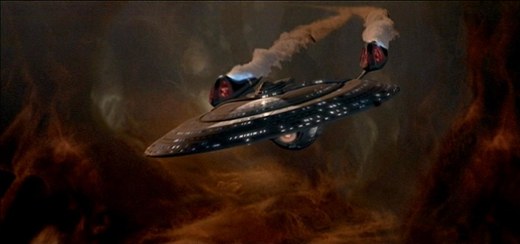
The U.S.S. Enterprise plays her part in helping to save paradise (image credit: Paramount Pictures).
The narrative may flow more like an episode of TNG and not necessarily fulfil the grander high-stakes ambitions of a feature film, but at the heart of Insurrection is a Roddenberry-esque morality tale and the script contains a few neat twists and turns, including the true motivations of the Son’a rising from their surprising history with the Ba’ku. There are also a number of decent action sequences, the standouts including the Son’a attack on the Ba’ku village, the battle in space as Son’a vessels pursue the Enterprise and the climactic confrontation between Picard and Ru’afo aboard the Son’a collector ship. The film is blessed with Matthew Leoneti’s beautiful cinematography, wonderfully captured from the Californian landscapes doubling for the Ba’ku planet. Jerry Goldsmith earns kudos for producing another excellent music score that draws on his previous Star Trek themes whilst creating new cues fitting of Insurrection’s story.
So, there are certainly positives in favour of Star Trek: Insurrection and although it doesn’t raise the bar for the Star Trek film series and may seem a little underwhelming when placed alongside First Contact, it still makes for entertaining viewing with solid cast performances, direction and neat action set pieces.
Geek fact!
Star Trek: Insurrection was the first Star Trek feature to move completely away from model effects work, utilising CGI for all its exterior spaceship sequences.
Image(s) used herein are utilised for illustrative purposes only and remain the property of the copyright owner(s).
